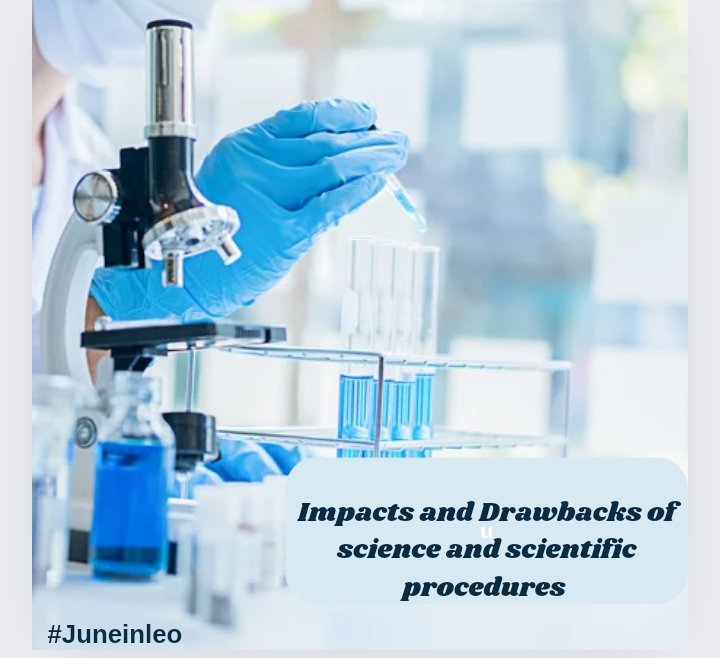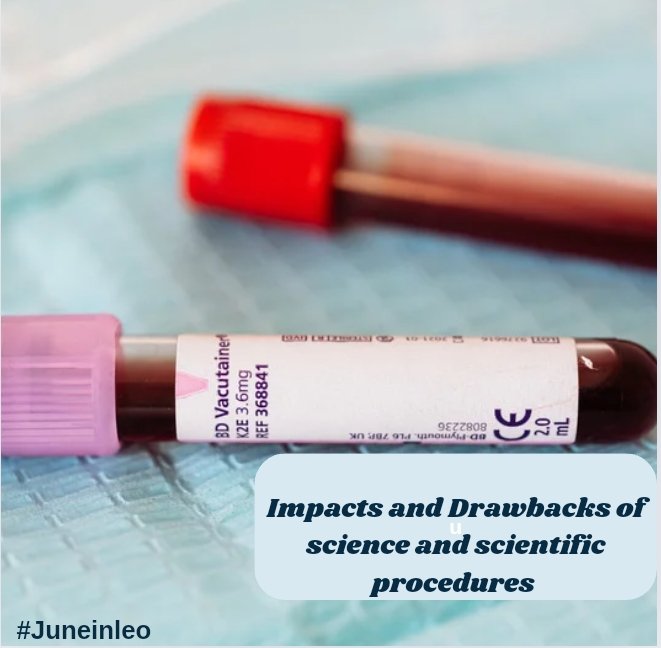Hello Hive
I was privileged to have undergone a science project and was even engaged in an accident involving both fire, chemicals, and all manner of organisms. These were under sterilization; hence, they had only minor impacts on my skin, while I had sustained some secondary burns or an infection. A new disease or infection can be generated from practicals and the search for solutions to existing challenges. All of the trials and errors do not come without a drawback.
Greater harm would have happened to me if there were some more deadly chemicals. The nuclear and chemical weapons used in wars often leave their victims with lifelong deformities. Hence, as much as we have enjoyed science in some aspects, there are some experiments and products of experiments that will cause us to lament about how science has gone too far in such aspects because of its negative impact on us.

- The benefits and drawbacks of science in some aspects.
Working as a farmer, I have enjoyed the numerous benefits of science experiments that have created the fertilizers and chemicals we use on our farms. The life cycle of plants has been altered to shorten the length of time, and the productivity level for each crop has been improved. All of these factors make cultivation, food production, and processing less of a burden for us.
The drawback to this is that numerous foodborne diseases have been traced to the kinds of agricultural food production methods deployed in recent years. Some processed foods and drinks have cancerous potential, and now people are hoping to return to the traditional method of food production to escape from these food-borne diseases.
- Benefits and Drawbacks of Science in the Medical Line.
Entering the medical line I have experienced some breakthroughs in my health as a result of several scientific procedures. Without science practicals, we wouldn't have become aware of certain diseases and disorders, including their causative agents and how to prevent ourselves from getting infected.
If you are familiar with sickle cell anemia, a blood disorder endemic to Africa, with a life expectancy of at most 25 years for those with the disorder, I can proudly say that science has helped out with various studies and experiments whereby the knowledge gained is now used to prolong the lives of people with the disorder.

Calling to mind my first blood transfusion experience. I have grown up with the moral and ethical code of never wishing to accept blood or any form of organ from a fellow human. I found it dreadful until I came. Under threatening conditions of chronic crisis, the doctors had to counsel me into accepting a transfusion in the teaching hospital.
Without the science experiments on blood—my blood group, genotype, rhesus compatibility, and other tests—my chances of survival would have been limited. Life expectancy for people living with sickle cell disease is now better than what it used to be, and routine drugs based on our scientific knowledge now give carriers a better and healthier life. While this is yet the good part, you may want to say that science went far on the other part here.
Would You and I accept a pig's kidney or heart or an animal's organ for whatever health conditions? Accepting a human body part may be a little moral and ethical, but accepting an animal organ may seem a little absurd to me.
A first patient, Richard Rick Slayman, who received a genetically engineered pig kidney, died two months after the procedure. According to this source
He was suffering from an end-stage renal disease and decided to accept a pig's kidney.
Although doctors were saddened by his death, if he had lived a longer life, this would have turned out to be another breakthrough in science. While some practicals are commendable and worthy of acceptance, others have remained deadly and not worth hearing or nearing acceptance, and such things have to be done in secret and kept confidential.
What more can we say about Robots and an the attempt by science to create a human being. I was told as a little kid that some science practicals created a human being but the only limitations was that they could not give it breath to breath like a normal human beings.
Even if this is still a myth it is only a matter of time and we would have a real science created human.
Should we also talk about the unethical transgender procedures and other practices?
I have watched a science movie where people were recruited against their wills to be used as specimens for deadly science experiments involving life-and-death situations. A lot is happening underground in the science world, and I hope that in the same way science practicals have improved our lives, they will not be used as a weapon to destroy the world as well.
Images are Canva generated and
This is my contribution to the #Juneinleo daily prompt, and I would like to invite you, my friends, to participate in the prompt and share your thoughts regarding the various interesting subject matter listed in the table using this link
Posted Using InLeo Alpha
Congratulations @monica-ene! You have completed the following achievement on the Hive blockchain And have been rewarded with New badge(s)
You can view your badges on your board and compare yourself to others in the Ranking
If you no longer want to receive notifications, reply to this comment with the word
STOPMuch of science is done with the desire to help people.
When you were mentioning blood transfusions I remember an experiment done by Canadian doctors on soldiers. At the time it was commonplace to give saline to wounded soldiers but the Doctors they might do better if they had blood. Guess what, blood transfusions worked so much better than sterile saline. From that on experiment new treatments were expanded.
Farmers have been doing "science experiments" for years by selecting the best seeds from the best crops to make the next generation of crops better. Many of todays crops are much more productive than they ever were in the past.
Computers, cellular phones, and so much more is the product of bright people trying to make peoples lives better.
Unfortunately advances come with costs. Cellphones are great...but what effect do they have on the family?
Blood transfusions are great...if they are available and done properly.
Better crops are great...as long as you have the skills and knowledge to plant properly, rotate properly and care for the soil properly.
Thanks for posting.
Have a great day
I have some questions regarding your post:
You wrote: "I have watched a science movie where people were recruited against their wills to be used as specimens for deadly science experiments involving life-and-death situations". <- What's the name of that movie?
You wrote: "Should we also talk about the unethical transgender procedures and other practices?" <- Sure, why not? 🙂 Why would you consider transgender procedures to be unethical?